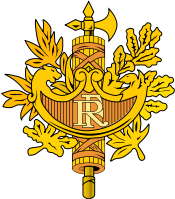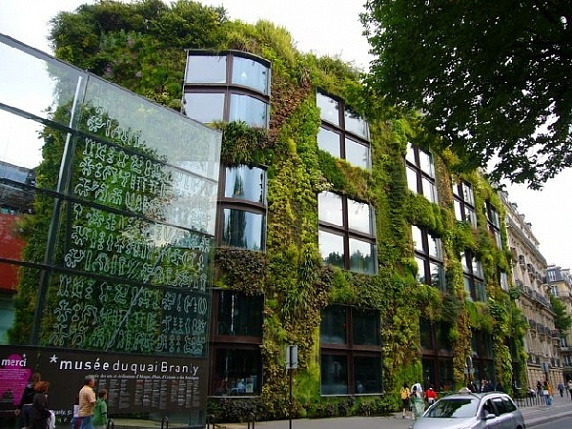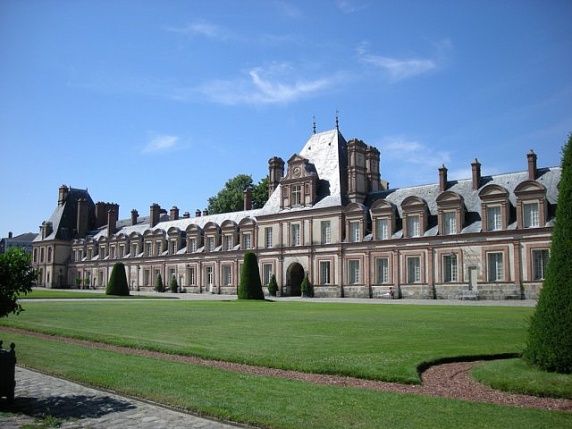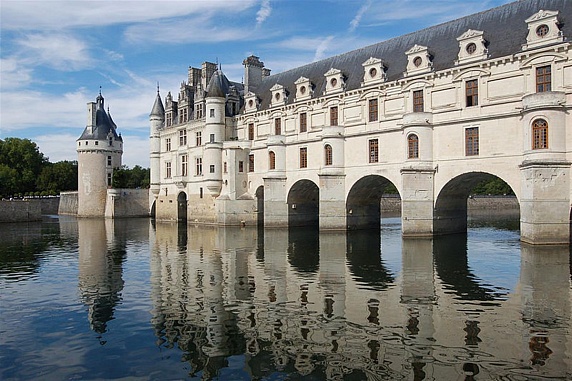 France (la République française)
France (la République française)
Foreign Minister Sergey Lavrov’s remarks and answers to media questions following his visit to France, Paris, November 12, 2021
I would like to say a few words about the meeting of the foreign and defence ministers of the Russian Federation and the French Republic, which were held today in the 2 + 2 format. It was not the first meeting held in this format, but there had been a rather long pause between the meetings. In 2019, President of Russia Vladimir Putin and President of France Emmanuel Macron agreed to resume this format during their meeting at Fort Bregançon. The first meeting after that was held in Moscow, and today we have met in Paris. We regard our dialogue in the 2 + 2 format as highly promising. We appreciate the desire of President Macron to find points of contact regarding the strategic aspects of developments in the Euro-Atlantic region and his resolve to develop constructive and mutually beneficial relations with Russia. It was in this spirit that we exchanged views on global security and the situation in the Euro-Atlantic area, Africa, the Middle East and the Asian-Pacific region. As usual, we did not try to avoid difficult matters. We discussed issues regarding which our views do not always coincide and are sometimes radically different.
For our part, we attracted our partners’ attention to the fact that the global situation remains very tense. We believe that the reason for this is the striving of some Western states, led by our American colleagues, to maintain and reinforce their domination, to destroy the UN-based architecture that was crated following WWII, and to force on the international public opinion a “rules-based order,” which directly contradicts international law.
One element of this is the attempts to contain Russia’s development. NATO and the United States have openly declared this course, which includes the bloc’s aggressive actions towards Russia. There are many examples, such as the deployment of additional forces in the Black Sea region, the dispatch of warships to the region on an unprecedented scale, and other aggressive actions.
We have seen our counterparts’ striving to strengthen and uphold the EU policy towards Russia, which has not changed for years. Its main point is that the EU is ready to normalise relations with Russia as soon as it fulfils the Minsk agreements. We have shown the absurdity of this with facts in hand. We have again reviewed the Minsk Package provisions, which say plainly that certain issues are to be coordinated between Kiev, Donetsk and Lugansk, such as the special status of these areas, the election procedures and an amnesty.
We proposed discussing ways out of the impasse in Russia-EU relations. We pointed out that we had supported President Macron’s idea of creating a European security architecture together with Russia rather than in opposition to it. As we see it, the main thing is for these worthwhile words to be translated into practical deeds. It is clear that the EU and NATO have internal discipline and the so-called solidarity. But the matter has not been settled.
Today I talked with President of the European Council Charles Michel on the sidelines of our Libya conference. He indicated his interest in looking for ways to lead our relationship out of the current deep stalemate, which has been created by the Western measures after some countries supported and others accepted the far-right government coup in Ukraine in 2014. We are feeling its effects to this day. Mr Michel’s position is that it is very difficult to convince our EU colleagues (I am not referring to France right now) of the need to develop relations exclusively on the principles of equality and a balance of interests. We are ready for this. We have confirmed this during our meeting with our French colleagues and during my contacts with Charles Michel.
We had an in-depth discussion on strategic stability, including in the context of the new challenges which arose after the United States withdrew from the Intermediate-Range and Shorter-Range Nuclear Forces Treaty and the Open Skies Treaty. We reaffirmed our commitment to exercising maximum restraint and refraining from fabricating unnecessary problems moving forward. We will reciprocate to any unfriendly steps the West makes in a tit-for-tat and, if necessary, asymmetrical manner.
We drew the attention of our interlocutors to President Vladimir Putin’s initiative to declare a unilateral moratorium on the deployment of land-based missiles that are banned under the INF Treaty until US-made systems of this kind are deployed to the corresponding regions of the world. At the same time, we pointed out that the prospects of an arms race in outer space is a matter of serious concern for us. The United States openly announced these plans. The French Republic has also come forward with a similar initiative recently.
Just like our French colleagues, we reaffirm that there is no alternative to the Minsk Package of Measures. However, its interpretations vary greatly. Our colleagues are increasingly convinced that it is Russia that must carry out these measures. The fact that this approach is meaningless and baseless is obvious to anyone who has had at least a glimpse of the Minsk agreements, which were approved by a UN Security Council resolution. Under this document, Kiev, Donetsk and Lugansk must agree on a number of key matters that are essential for settling Ukraine’s internal crisis. Once again, we called on Paris to work together with Berlin not just to encourage, but to force the Ukrainian authorities to deliver on the international commitments they assumed. We highlighted the unacceptable nature of Kiev’s policy of de facto segregating its citizens. We reminded our counterparts that the West has yet to respond to President Vladimir Zelensky’s catch phrase when he said that those in Ukraine who identify as Russian should clear out and go to Russia.
We have not heard any answers to these and many other facts, including the drafting in Ukraine of a new law to dismantle the Minsk agreements in the wake of the laws on education and language. I am referring to the bill On the Principles of the State Policy of the Transition Period, as drafted by the Ukrainian government. The Venice Commission concluded that it is more or less valid, which is a disgrace for this institution. Furthermore, it went as far as compare the proposals contained in this draft law with the provisions of the Minsk agreements and the Security Council resolution. Its adoption will signal Kiev’s withdrawal from the Package of Measures. Let me remind you that we received assurances from the French and the Germans at the highest level that they will do everything in their power to prevent this law from being adopted. However, nothing has been done since that time, and the developments in the Verkhovna Rada show that it is moving towards its adoption full steam ahead.
We discussed the Iranian nuclear programme. On this topic, there is potential for more constructive cooperation. The participants in the Joint Comprehensive Plan of Action on the Iranian nuclear programme are scheduled to resume talks on November 29. We stand for fully reviving the arrangements under the 2015 document as approved by a Security Council resolution. This includes the United States recommitting to its obligations, including to lifting all sanctions imposed in the JCPOA context.
We paid special attention to the Middle East Peace Process. There is a joint format, the Quartet of international mediators, which includes Russia, the European Union, the United Nations, and the United States. Unfortunately, so far, we have been unable to revive this format because the United States does not agree to do so as soon as possible. Meanwhile, the situation in Palestinian territories is escalating, and the humanitarian crisis in Gaza is worsening. Together with our French colleagues, we are ready to make additional efforts. We will see what comes out of this. At least, this is what we agreed upon.
We discussed the Syrian issue. There are UN Security Council resolutions that must be implemented. The main pillars of the settlement process are set forth in the baseline resolution adopted this past summer. It demands that humanitarian aid be expanded and, even more importantly, requires that all obstacles to enabling Syria to undertake early recovery projects be removed. This covers energy and water supply, education, healthcare, and housing construction.
We discussed developments in Libya. An international conference on the Libyan issue has taken place, convened by President of France Emmanuel Macron. Its participants adopted a lengthy outcome document that has been circulated and is available. This document follows in the footsteps of the resolutions adopted at the preceding conferences on this subject, including the Berlin conference in June 2021. What matters the most here is the call on the parties to the conflict in Libya to stick to the timeline they agreed upon one year ago, primarily regarding holding general elections, which includes both the presidential and parliamentary elections. It is also vitally important to ensure that the electoral process is inclusive so that representatives of all social and political groups in Libya can take part in the election campaign.
We touched on the situation in the Sahara-Sahel region, including in the context of the repositioning of the French forces there, including from Mali. It caused the concern of the Malian leadership that the French wanted to leave the northern areas of the country, where heightened activity of terrorist groups has been observed of late. We cleared up the situation with the accusations regularly made against Russia to the effect that it encourages contacts between the Malian leadership and a Russian private military company. We have shown the lack of grounds for such accusations. We pointed out that we are providing military-technical aid to Mali and assisting it in organising the work of its security services and the army as part of our interstate cooperation. As for private military companies, we referred to the facts proving that this phenomenon was not created in Russia but in the West. We provided examples of operations carried out by such PMCs that originated in the United States, the UK and France. There are a great many of them. The scope of what our Western colleagues have done is a far cry from what PMCs set up by Russian citizens are doing. We spoke in favour of joining efforts against terrorist groups in the Sahara-Sahel region. They have run amok there ever since the West bombed out Libya and destroyed its statehood. We are trying to restore its statehood now, which requires constant efforts.
We also talked about the Central African Republic (CAR). We have a wealth of experience of cooperating with France at the UN Security Council. We have recently adopted a resolution (we discussed it with Paris in great detail) which expands the list of armaments subject to the notification requirement when supplied to the CAR. It is critically important for the success of that African country’s counterterrorism efforts.
We discussed the situation on the Balkan Peninsula. We drew the attention of our French colleagues to the fact that the West is now trying to promote absolutely illegitimate solutions in Bosnia and Herzegovina, where the Steering Board of the Peace Implementation Council responsible for implementing the Dayton Peace Agreement operates. Russia and France are involved in its work. For example, this concerns the “appointment” of a new High Representative. This happened a few months ago in violation of the procedures stipulated by the Dayton Peace Agreement, which requires the consent of all three titular nations. This also violated the provision that this decision must be approved by the three Bosnian nations as well as by the UN Security Council. We noted that the risky path chosen by our Western partners undermines the very foundations for the co-existence of Serbs, Bosniaks and Croats within a single state.
We noted that on another Balkan front, namely, in Kosovo, the European Union, acting as the UN General Assembly’s mediator, is unable to implement the decisions adopted with its assistance by Belgrade and Pristina in 2013. I am talking about the agreement to establish the Community of Serb Municipalities in Kosovo. This crucial matter allows Serbs to retain their identity in this territory. We would like to praise and thank the EU for facilitating this agreement some time ago. However, the very fact that the EU has so far been unable to persuade Pristina to honour its obligations speaks volumes.
We discussed the situation in Afghanistan. We voiced common approaches and believe that the Taliban should honour all of their statements made following their coming to power.
We touched upon the peace process in Nagorno Karabakh in the context of the efforts by the OSCE Minsk Group’s co-chairs, specifically, Russia, France and the United States. Several days ago, Paris hosted a meeting of the three co-chairs and the foreign ministers of Armenia and Azerbaijan. Everyone supported the November 9, 2020 agreement between President of Russia Vladimir Putin, President of Azerbaijan Ilham Aliyev and Prime Minister of Armenia Nikol Pashinyan. We noted progress in the efforts of the Russian peacekeeping contingent to resolve a number of humanitarian matters. We also charted a number of areas that require additional efforts. In the short term, the co-chairs will focus on addressing humanitarian issues and creating favourable conditions for the region’s Armenian and Azerbaijani communities to build an atmosphere of trust and address everyday matters in the spirit of constructive compromises.
We considered the schedule of our further political contacts and expressed a shared interest in the continued functioning of the 2+2 format.
I would like to note that our French colleagues mentioned the migrant crisis on Belarus’ border with Poland, Latvia and Lithuania. We explained the situation, where there should be no double standards as compared with how migrants are treated in other EU countries, rather than on the border with Belarus. Countries must act in a coherent manner and have full respect for the fundamental principles of international humanitarian law. I don’t think we have convinced our colleagues. But at least we have arguments that they thought better of contesting: they only urged us to help convince Minsk to solve the problem. But this does not depend on Minsk alone – by far. It is a situation where the European Union should display a constructive approach. We talked about this with President of the European Council Charles Michel earlier today.
Question: What is it that guides the Poles and some other EU members, who are accusing Russia well-nigh of creating the migrant crisis on the Belarusian-Polish border? How can Russia respond to these charges, as well as to potential sanctions against Aeroflot? Did you discuss these accusations today?
Sergey Lavrov: Russia should respond quite simply – by ignoring this empty verbiage, those tough and arrogant statements dictated by nothing else than Russophobic instincts.
There was no talk of Aeroflot whatsoever. Everyone is aware that this is sheer silliness. It is not at all difficult to compare these charges with the freely available data on how, or to or from where Aeroflot flies. But to do this, one should at least try to make head or tail of the situation.
We reminded them of how the EU responded to various crises. In June, for example, when there was an incident involving a Ryanair plane, President of Belarus Alexander Lukashenko suggested holding expert consultations as soon as the first accusatory invectives were hurled. The EU refused and introduced sanctions against Belarus. It was only after this that it called for an objective investigation to be launched by the International Civil Aviation Organisation. The investigation is yet to be completed. Its deadline has been postponed on two occasions and it is unlikely to be over by the end of the year.
Today, I told President of the European Council Charles Michel that if they are concerned with solving problems arising between them and the Republic of Belarus, they should choose whether they want to have consultations, as Chancellor Angela Merkel is suggesting to President of Belarus Alexander Lukashenko, or to show their might and aggression by imposing illegal sanctions on the country. To my mind, a conversation on these themes should be honest and open. I hope that the sound minds in the EU are aware of this and hear these arguments. Regrettably, however, there is an aggressive minority running the show in the EU and it repeatedly has its way.
Question: Did you discuss the possible recognition of the Sputnik V vaccine during your contacts with the French party today?
Sergey Lavrov: No, we did not. But we are monitoring the process. France is one of the EU countries that are waiting for the decision of the World Health Organisation (WHO), which has been protracted for objective and subjective reasons. Our relevant agencies are working together with the European Medicines Agency and the WHO.
A number of EU countries, first of all Hungary, have decided to recognise our vaccine. There is a concrete problem in this area. Our diplomats in France are unable to freely perform their duties. They are obliged to take PCR tests every other day, which we do not demand from the French diplomats in Moscow. They can receive any vaccine they want and calmly carry out their duties, moving freely around Moscow and other cities. I believe we can settle this problem.
In conclusion, I would like to say that we are interested in working together with the EU. There are quite real and not imaginary reasons for this, as the pandemic has demonstrated. We must get together and put our commercial interests aside. Back in April, President Putin proposed a waiver on patent protections for all vaccines during the fight against the pandemic. The idea vanished into the blue. There was no reaction. It’s a pity that many parties are only thinking about their own benefit, which they are trying to ensure at the expense of others. Nevertheless, we are ready and resolved to restore constructive relations with the EU, which the EU itself has destroyed.
Today we spoke about climate, healthcare, green economy and digitalisation. We discussed these issues back in February, when High Representative of the EU for Foreign Affairs and Security Policy Josep Borrell visited Moscow. I believed that we had coordinated all the issues needed to launch our practical efforts, not just words, but ensuring that our professionals can get down to practical tasks. But nothing has worked out so far. I explain this by the inertia of the Russophobic minority, which is forcing its policy on all sober-minded and reasonable EU members.
Question: The Declaration of the International Conference for Libya adopted today includes a provision on the withdrawal of mercenaries and foreign forces from the Libyan territory. Can you say how this can be done, considering Turkey’s insistence that its forces are deployed in Libya on legal grounds? Do you think that the upcoming December 24 elections in Libya could be undermined by Tripoli’s tough stance?
Sergey Lavrov: I am not going to speculate about the elections. There is evidence that a number of Libyan politicians would like to adjust the decisions adopted a year ago within the framework of the roadmap for a peaceful settlement, in particular, the principle for forming a list of candidates. But I do not think we should focus on any particular date now, especially since it was chosen arbitrarily, rather we should work to properly prepare for the elections, in a way that will leave no room whatsoever for doubts regarding their results. In this context, I believe it is important – we spoke about this today – that all political forces, including the supporters of the Gaddafi regime, have an opportunity to nominate their candidates for these elections.
As for the withdrawal of foreign forces and so on, the decision we adopted today reaffirmed the formula set out in the final document of the Berlin Conference in June 2021 and the formula approved by Libya’s 5+5 Joint Military Commission several weeks ago. The withdrawal must be complete, phased, gradual and synchronised with regard to both the supporters of Libya’s west and east. It is crucial to keep the balance, which has developed on the ground in Libya and has made it possible to maintain the truce there for over a year. If it is violated now – I hope that this will not happen, the risk of new hostilities will increase. This is our position.
Question (retranslated from English): France increasingly often declares the need to build up potential in the information space. For example, French Chief of the Defence Staff General Thierry Burkhard mentioned a “hybrid war” in his recent interview with Le Point. He also said that information warfare was part of the struggle for influence (in the Russian context, he referred to Crimea’s return to Russia). Poland has described the situation on the Belarusian-Polish border as a textbook example of such a war. Can you comment on these statements? Have you discussed matters related to RT’s operations in France with the French side?
Sergey Lavrov: I understand why you are putting this question to me. Probably you yourself are unable to ask the French leaders this question, since you are not accredited at the Élysée Palace. Am I right?
Today, we have directed our interlocutors’ attention to this matter, as we have to the fact that this, as well as many other actions by our Western, including French, colleagues, directly contradict the commitments coordinated within the OSCE at the West’s initiative in the early 1990s. These commitments require the removal of any obstacles to any information sources within relevant countries and abroad. We were talking about this. And we often speak about this. We believe that the current rhetoric, including statements announcing space militarisation plans or promulgating the concept of information wars, is a dangerous thing. Later, these words will be translated into concrete projects. Someone will make money out of this or a political name, but eventually this will create ever new threats.
I heard that President of France Emmanuel Macron had signed an executive order establishing an agency that would fight disinformation coming from abroad. Today, I asked our interlocutors – the foreign minister and the defence minister – to give us an idea of how this agency would function. In response, we would be ready to describe how the relevant government agencies operate in Russia. But this problem does exist. And it is becoming increasingly urgent.
Question: You spoke today about the need to resume dialogue with the Europeans, but High Representative for Foreign Affairs and Security Policy Josep Borrell, for one, is strongly biased against Russia and makes extremely tough statements. Another case in point is Spain, where we are often accused of interfering in their internal affairs in the context of the referendum. France is getting ready for a referendum on the possible secession of New Caledonia and for the presidential elections. In this context, there are statements that Russia is supporting this or that candidate. How are these accusations affecting the resumption of dialogue?
Sergey Lavrov: Any of my replies will be used against me and interpreted as a case of interference in the internal affairs of France, Spain, or other countries.
As for Mr Borrell… It seemed to me that we were cooperating smoothly when he was the foreign minister of Spain. But something happens to people when they take the office of the High Representative. Evidently, this is inevitable, because with a job in Brussels you must reflect the consensus of the collective “bloc discipline,” as (his predecessor) Federica Mogherini did. This consensus is shaped by the countries which are keen to fan tensions between the European Union and the Russian Federation in every way for their internal subjective reasons, such as historical phobias, or the desire to settle historical scores, or many other things of the same sort.
There was one striking moment. The Americans and their allies have just left Afghanistan. A few days after that, Josep Borrell came up with remarks saying the EU should not allow Afghanistan to “fall into the lap” of China and Russia. Is this a normal way to describe the situation in a region located rather far away from the EU? Or is it normal for them to tell us that cooperation with the Central African Republic or with Mali will be the red line? “This is an area, where the EU has a historically established relationship.” The Europeans do not specify that this is a colonial story, but all the same… Simultaneously they are developing strategies of their own (without consulting anyone) with regard to Central Asia and the Black Sea, this despite the fact that these regions already have regional cooperation organisations, constitutional documents, as well as plans and projects of their own. Evidently, in the globalised world you should not say: “This is my territory – no one should trespass into it because I have ‘marked’ it (in some or other manner).” This will be a throwback to the zones of influence philosophy. We want to give it up. The remote countries’ relations with our closest neighbours should be built in such a way that they do not damage our interests and the commitments that we and our neighbours assume as allies and strategic partners, both bilaterally and within organisations such as the CSTO, the EAEU, the SCO, and the CIS.
Question: Today’s International Conference for Libya is being attended by a great number of high-ranking guests, including Angela Merkel and Kamala Harris. Have you managed to exchange views with them on bilateral issues?
Sergey Lavrov: We were rather short of time. There was a general discussion. We briefly met with Charles Michel and managed to talk at some length about how to normalise relations between Moscow and the EU.
I had a lengthy, full-scale meeting with President of the Republic of the Congo Denis Sassou Nguesso. He visited Moscow not so long ago and made agreements with President Vladimir Putin. We discussed how these agreements were being implemented. On the whole, they are being implemented fairly well. There are a number of issues that require further attention. We discussed this matter as well. I am referring to our economic cooperation and projects that are being considered by the relevant companies and agencies in Russia and the Congo.














